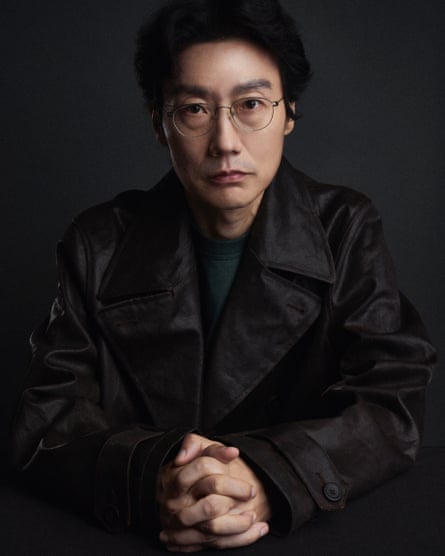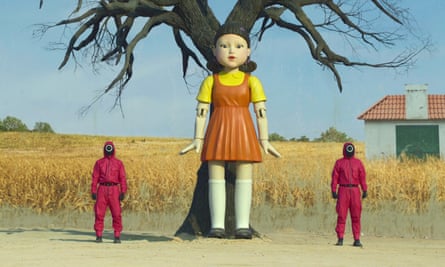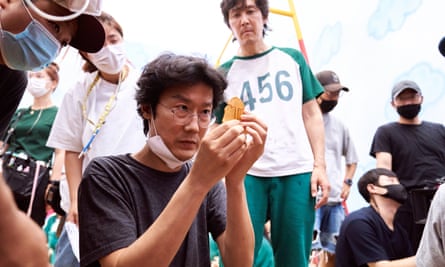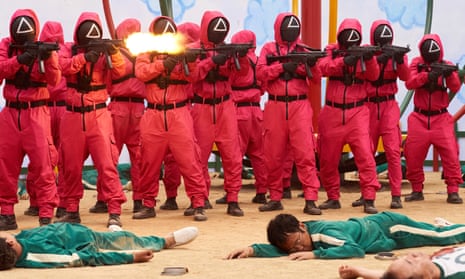Hwang Dong-hyuk is laughing at me from his office in Seoul. I’ve just asked the creator of Squid Game, Netflix’s smash hit show, if its astonishing success has made him rich. In the dystopian survival drama, a mysterious organisation challenges 456 players from all walks of life – each deeply in debt – to play a series of children’s games. Win and they go home with 4.6bn won (£28m). Lose and they get a bullet in the head.
Perhaps Hwang is now as rich as the contestant who wins the top prize? “I’m not that rich,” he says. “But I do have enough. I have enough to put food on the table. And it’s not like Netflix is paying me a bonus. Netflix paid me according to the original contract.” That seems unfair. After all, the 50-year-old South Korean film-maker has made hundreds of millions for his paymasters. Squid Game earlier this month overtook Bridgerton as the most successful Netflix show ever. According to leaked documents, the nine-episode run cost £15.5m to produce, which works out at £1.75m per instalment. Its return on that has been extraordinary. The series – which Netflix estimates has been watched by 142m households and boosted its subscriber figures by 4.4m – is thought to be worth £650m to the streaming service.
Perhaps Hwang should have negotiated a performance-related clause, particularly as creating, writing and directing it caused him so much stress that he lost six teeth in the process. “It was physically, mentally and emotionally draining. I kept having new ideas and revising the episodes as we were filming so the amount of work multiplied.”
The idea for Squid Game came out of Hwang’s own family situation in 2009, after the global financial crisis that hit his homeland hard. “I was very financially straitened because my mother retired from the company she was working for. There was a film I was working on but we failed to get finance. So I couldn’t work for about a year. We had to take out loans – my mother, myself and my grandmother.”

Hwang sought relief in Seoul’s comic book cafes. “I read Battle Royal and Liar Game and other survival game comics. I related to the people in them, who were desperate for money and success. That was a low point in my life. If there was a survival game like these in reality, I wondered, would I join it to make money for my family? I realised that, since I was a film-maker, I could put my own touch to these kinds of stories so I started on the script.”
He drew on a version of tag he played as a boy called squid game, named after the various squid-bodypart shapes that were drawn on to whatever field it was played on. “I used to be good at fighting my way to the squid’s head,” Hwang says. “You had to fight to win.”
In the first game in the show, all 456 contestants can only move when the face of a sinister mechanised doll is turned away from them. Those caught out are mown down with machine-gun fire. Why did Hwang create a horrifyingly brutal contest that holds human life so cheap? “Because the show is motivated by a simple idea,” he says. “We are fighting for our lives in very unequal circumstances.”
Are you making a profound point about capitalism? “It’s not profound! It’s very simple! I do believe that the overall global economic order is unequal and that around 90% of the people believe that it’s unfair. During the pandemic, poorer countries can’t get their people vaccinated. They’re contracting viruses on the streets and even dying. So I did try to convey a message about modern capitalism. As I said, it’s not profound.”
But isn’t there a contradiction in that, without money from an international corporation, ie Netflix, your critique of global capitalism would never have been seen? Hwang laughs at me again and says: “Oh, the Guardian, asking profound questions! Well, Netflix is a global corporation but I don’t think it is aggravating inequalities. I don’t think there is a contradiction. When I was working on the project, the goal was to rank No 1 on the Netflix US chart for at least a day. But it ended up being much more successful, the most watched show on Netflix ever. It’s very surprising. It shows that the global audience is resonating with the message I wanted to reflect.”
Did Hwang watch Bridgerton to study the competition? “I find it difficult to watch any series in full. There are only two I’ve watched through to the end: Breaking Bad and Mind Hunter. People said Bridgerton was very good so I tried watching episode one but I gave up in the middle. I’m not really into TV romance stories because it’s been six or seven years since I was in a relationship. I find it really hard to relate to.”

Perhaps that’s why the sex scenes in Squid Game are so grim. I’m thinking of the one in episode four when two players, one a macho gangster, have sex in a bathroom. There is no love in Squid Game, is there? “Yes there is!” Hwang insists. “It’s a different kind of love in a bizarre, strange, desperate situation. The woman relies on the strongest man in the group. She has to find something to rely on. She believes it’s love – otherwise it’s too sad, you know, to sell sex to the guy just to survive. So she believes her emotion is love, but not romantic love like in Bridgerton.”
Hwang says he wrote this scene after watching a TV reality show in which contestants are stranded on a desert island. “It was about people’s psychology in extreme situations. They are sexually attracted to people they believe are stronger and the best at hunting, when they wouldn’t have been before.” Aren’t you depicting women as sexualised commodities? For once, Hwang’s smile fades: “Why are you asking about excessive sexual representation of women?” He says his only purpose was “to show that, regardless of gender, women and men tend to perform desperate actions in extreme situations”.
One Squid Game contestant is a North Korean defector. “They’re probably the biggest minority in South Korea now,” says Hwang. “That’s only going to increase. I think exchange between the two Koreas is going to expand. We are going to reach reunification at some point. I hope so.” North Korea has not taken such a benevolent line on the show. According to propaganda site Arirang Meari, Hwang’s drama shows South Korea is “infested by the rules of survival of the fittest, corruption and immorality”. Not words, of course, that could ever apply to truly egalitarian North Korea.
But Squid Game is hardly just a snapshot of his home country. “I wanted to create something that would resonate not just for Korean people but globally. This was my dream.” In this life and death struggle, social norms are torn away and the contestants are trapped in a war of all against all, in which human life is nasty, brutish and short. “We are living in a Squid Game world,” says Hwang, but he says not everybody in his drama is selfishly looking after number one, climbing over losers’ faces to win the money.
Some viewers have found the denouement – in which the winner makes two surprise decisions to do with family and prize money – exasperating. US basketball legend LeBron James, who loved the show, had this to say: “I didn’t like the ending though. What are you doing?”

Is James wrong? Hwang giggles from Seoul, before referencing one of James’s film career highlights. “Have you seen Space Jam 2?” he asks. Not all the way through, I reply. “LeBron James is cool and can say what he wants. I respect that. I’m very thankful he watched the whole series. But I wouldn’t change my ending. That’s my ending. If he has his own ending that would satisfy him, maybe he could make his own sequel. I’ll check it out and maybe send him a message saying, ‘I liked your whole show, except the ending.’”
But surely there is another reason for that ending: it’s teed up nicely for a sequel, with the winner able to take on the diabolical secret organisation that runs Squid Game. No announcement has been made and Hwang isn’t sure there will be a season two, nor what its story would be. “Of course there is talk. That’s inevitable because it’s been such a success. I am considering it. I have a very high-level picture in my mind, but I’m not going to work on it straight away. There’s a film I really want to make. I’m thinking about which to do first. I’m going to talk to Netflix.”
He doesn’t want to become just the Squid Game guy and is now lobbying Netflix to screen three movies he made in the past decade. But he certainly hasn’t ruled a sequel out – if only for one very material reason. “It’s possible,” he says with one last laugh, “that I have to do season two to become as rich as Squid Game’s winner.”

Comments (…)
Sign in or create your Guardian account to join the discussion